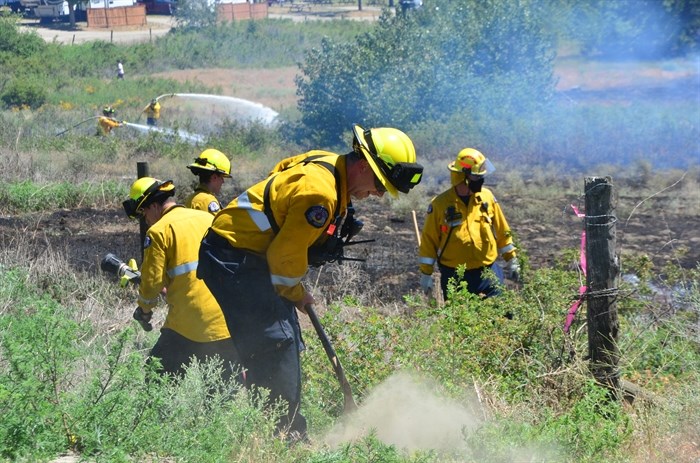
FILE PHOTO
(MARSHALL JONES / iNFOnews.ca)
January 24, 2022 - 7:00 AM
A rural fire department is struggling to find volunteers and is partnering with neighbouring rural communities to pool resources.
Chase Fire Rescue had to rely on the help of other rural fire departments from Pritchard, Adams Lake and Little Shuswap Indian Band as five firefighters had to leave for their other jobs while combating a large fire at an auto recycling facility, Jan. 21, Fire Chief Brian Lauzon said.
READ MORE: Blaze at Chase auto recycling shop destroys numerous vehicles
In the last few decades, rural fire departments have increasingly struggled to fill their rosters with volunteers and the Village of Chase is no exception. The fire department has served the village for the last 108 years, according to its website.
There were 152,650 local firefighters in Canada, from 2014 to 2016, and 83 per cent are volunteer firefighters. In rural communities with populations less than 50,000, firefighters are more likely to be volunteers, according to the National Fire Protection Association.
“It’s gradually getting worse and worse and worse,” Lauzon said. “We do the same job basically as career fire departments do, you know, a house burns in Chase the same as it burns in Kamloops or Vancouver so we have to train to the same standards and keep things as safe as possible and yet working other jobs to feed our families and pay our bills.”
The fire department has 18 on-call members. Lauzon would like to see about 30 on the roster. The typical turnaround for the department has been a year.
Last year, the hall was shut down for practices and training because members caught COVID-19, but they still had to respond to calls.
“It’s been challenging and scary," he said. “During the day, we might have two or three in town.”
It’s also affecting the department’s capabilities to respond to an emergency.
Lauzon said they’re relying more on other rural departments in the area to fill that void and have started creating plans for when wildfires reach the area or other emergencies happen and they need help.
“It’s a huge struggle and we have to grow and adapt with it. Unfortunately, if you don’t have firefighters paid as a real career, it’s very difficult and I’ve heard of departments… some in Canada have folded because they just don’t have the membership,” he said.
READ MORE: Okanagan firefighting communities struggling to find paid on-call recruits
“You feel bad because you have to leave town but I have to feed my family and pay my bills… it does take response time from other communities to help out, we’re looking at about 20 minutes and if they can get through depending on the hazard. It’s bad, it’s really, really bad.”
Money is needed, but the tax base of Chase isn’t very big, he said.
Peachland Fire and Rescue Service has been fortunate and its latest recruitment campaign was successful as they found eight new recruits, said fire Chief Dennis Craig.
They held an open house during wildfire season when there was lots of publicity to the issue and were able to find recruits from there, he said.
“I think wildfire season’s brought some more awareness to the issue, I don’t think we’re an exception. We don’t have a waiting list, some departments to the north of us in West Kelowna and Lake Country, have a little bit more choice on who they bring on… even with this latest recruitment we didn’t have more applicants than vacancies,” Craig said.
The changing trend for Peachland is not everyone is able to make as many calls and practices as they used to and the fire department has now implemented a mandatory training policy so people show up.
“People have more than one job to be able to stay above the poverty line and when they start having families and wanting to do more social activities, there’s not enough time in the day to accommodate everything,” Craig said.
READ MORE: Volunteer fire departments in B.C. still face training, cost challenges meeting new standards
COVID-19 has also made things difficult for the department as when the fire hall had to operate at a reduced capacity, some on-call firefighters didn’t return since their lifestyle changes no longer suited firefighting. Advertising also changed when they used to advertise at gyms and hardware stores.
The average age of their latest recruits is in their mid-20s. “It’s very unique I think for sure, especially for Peachland when the average age is 55, from a Census perspective,” Craig said.
To contact a reporter for this story, email Carli Berry or call 250-864-7494 or email the editor. You can also submit photos, videos or news tips to the newsroom and be entered to win a monthly prize draw.
We welcome your comments and opinions on our stories but play nice. We won't censor or delete comments unless they contain off-topic statements or links, unnecessary vulgarity, false facts, spam or obviously fake profiles. If you have any concerns about what you see in comments, email the editor in the link above.
News from © iNFOnews, 2022